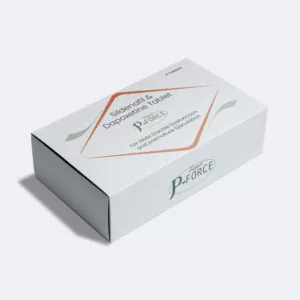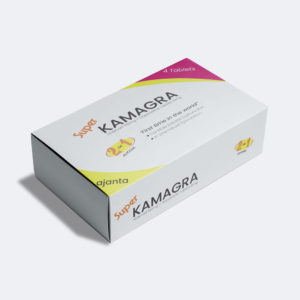Premature Ejaculation
Premature ejaculation (PE) is one of the most common male sexual health issues, and it’s more normal than most people think. Whether it happens occasionally or becomes a regular struggle, PE is typically defined by a consistent inability to control ejaculation, usually within one to three minutes of penetration. It can seriously impact confidence, relationships, and overall satisfaction in bed.
PE isn’t just a “young guy” problem, and it’s not always psychological. It can be triggered by low serotonin, performance anxiety, stress, underlying conditions like erectile dysfunction, or even high penile sensitivity. Fortunately, PE is treatable, and you don’t have to wait for it to fix itself.
If you’re looking for fast, effective relief, several proven options are available. Oral treatments like Dapoxetine are clinically designed to delay ejaculation by balancing brain chemicals. Off-label antidepressants like Sertraline or Paroxetine also help many men gain more control. Prefer something instant? Numbing creams and wipes with lidocaine or benzocaine offer fast, topical relief; just apply before sex to reduce overstimulation without sacrificing pleasure.
We offer a full range of PE treatments that cater to different needs, daily or on-demand pills, topical solutions, and combination strategies. If PE affects your confidence or intimacy, now’s the time to take control. The right product can make all the difference and is more accessible than ever.
Safe and Affordable
Discreet Packaging
Trustpilot Verified
Hassle Free Delivery
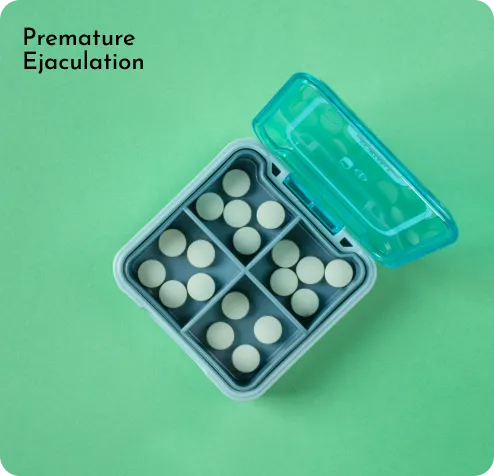
Filter by categories
Premature ejaculation (PE), also known as early ejaculation, early climax, or rapid ejaculation, is a common sexual dysfunction in men. PE occurs when a man ejaculates sooner than he or his partner desires during sexual activity. Most men with PE experience a lack of control over ejaculation. This condition is usually measured using intravaginal ejaculation latency time (IELT), which refers to the time between vaginal penetration and ejaculation. A typical IELT ranges between 4 to 8 minutes. Men with PE often ejaculate much sooner, sometimes in less than a minute. This condition can occur occasionally or be persistent, depending on individual factors. Many men mistakenly believe that PE is untreatable or abnormal. PE is not a disease. It is a widespread issue affecting approximately 1 in 3 men aged 18 to 59 years in the United States alone. The stigma surrounding rapid ejaculation still exists, but treatment options are available.
How long is considered premature ejaculation?
Premature ejaculation is generally defined by the inability to control ejaculation for a satisfactory duration. Experts from the International Society for Sexual Medicine define PE as ejaculation occurring within approximately one minute of vaginal penetration. The Diagnostic and Statistical Manual of Mental Disorders, Fifth Edition (DSM-5), supports this definition. The International Classification of Diseases (ICD-10) considers ejaculation within 15 seconds of penetration as premature. Most clinicians use a cut-off point of 2 to 3 minutes to assess the condition. However, the specific duration is less important than whether ejaculation occurs before either partner is satisfied. Many men experience occasional rapid ejaculation, but PE is diagnosed only when this pattern becomes consistent and distressing.
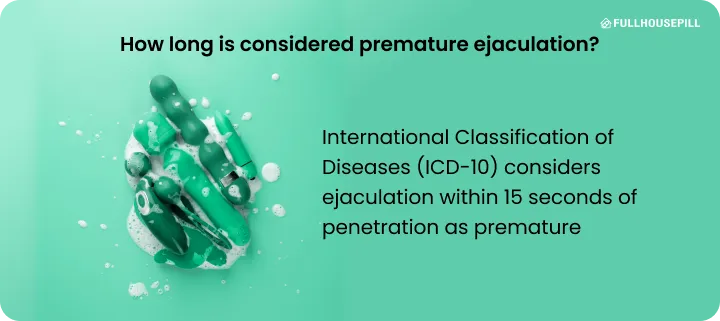
What are the symptoms of premature ejaculation?
Premature ejaculation (PE) is mainly defined as climaxing earlier than you or your partner want during sex. The key issue is a lack of control over ejaculation, but the impact often runs deeper than that. Below are the most common symptoms associated with PE:
- Inability to delay ejaculation: Ejaculation happens too quickly, often within one minute of penetration or even before it.
- Loss of control: Men with PE usually feel unable to manage or postpone ejaculation, despite trying.
- Performance anxiety: Fear of ejaculating too early can worsen the problem and create a cycle of stress and disappointment.
- Frustration or embarrassment: The experience can lead to feelings of shame or inadequacy, especially if it affects intimacy.
- Negative self-image: Persistent PE may lead to doubts about sexual ability or masculinity.
- Emotional distress: PE can trigger feelings of anger, sadness, or hopelessness, especially if the issue remains unresolved.
- Avoidance of sexual activity: Many men withdraw from intimacy to avoid disappointment or judgment.
- Relationship strain: Ongoing PE may cause emotional disconnect or tension with a partner, especially if communication breaks down.
- Partner dissatisfaction: The condition can leave partners feeling unfulfilled or emotionally disconnected, creating further tension.
These symptoms can appear at any age and are often linked to psychological causes such as stress, anxiety, depression, or past trauma. If these issues sound familiar or disrupt your intimacy, professional treatment can help restore confidence and control.
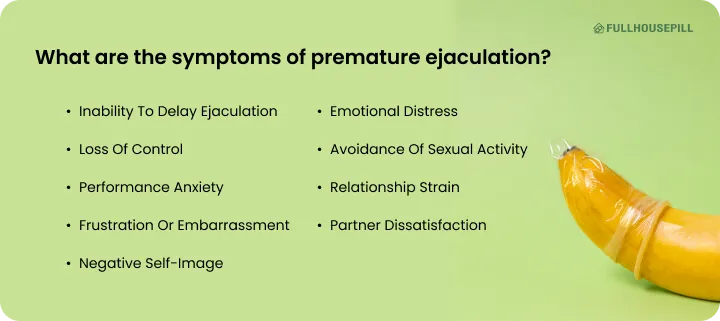
What are the causes of premature ejaculation?
The causes of premature ejaculation can be psychological, biological, or emotional. No single cause has been confirmed, but several contributing factors have been identified.
Psychological causes
- Anxiety and stress: Heightened mental stress or generalised anxiety can trigger early ejaculation by overstimulating the nervous system.
- Performance anxiety: Worrying about finishing too soon often becomes a self-fulfilling prophecy.
- Relationship issues: A lack of trust, poor communication, or emotional disconnect with a partner can reduce sexual confidence and control.
- Depression: Depression often suppresses arousal and sexual function, weakening control over ejaculation.
- Early sexual experiences: Rushed or negative first encounters can create long-term performance pressure.
- Low self-esteem and body image issues: Feeling inadequate can lead to hurried, anxious sexual activity and poor control.
Biological and medical causes
- Low serotonin levels: Serotonin, the brain chemical responsible for regulating mood and arousal, plays a crucial role. Men with lower levels often experience reduced control and quicker ejaculation.
- Erectile dysfunction (ED): Men with ED may rush to climax before losing their erection, unintentionally creating a habit of early ejaculation.
- Hormonal imbalances: Irregular levels of testosterone or thyroid hormones, especially in conditions like hyperthyroidism, can influence timing.
- Prostatitis: Inflammation of the prostate gland has been linked to PE in some men.
- Medications: Certain drugs, particularly those affecting the nervous system, list PE as a possible side effect.
- Neurotransmitter imbalances: Dysfunction in how the brain regulates serotonin can directly affect ejaculation control.
- Genetic predisposition: Some researchers suggest a hereditary component to lifelong PE, though no specific gene has been confirmed.
- Increased penile sensitivity: Unusual nerve responses or hypersensitivity may also contribute.
- Age-related changes: Declining testosterone and less rigid erections in older men can indirectly lead to quicker climax.
- Outdated theories: Past beliefs blamed rapid adolescent masturbation, but this lacks solid evidence.
In most cases, PE is a combination of mind and body working against you, but it’s highly treatable. Whether through medications, therapy, or a combo of both, solutions exist to help you regain control.
How do you diagnose premature ejaculation?
The diagnosis of premature ejaculation is based on a consistent pattern of early ejaculation that causes distress. Most healthcare providers make this diagnosis after a physical examination and a detailed sexual history. No specific lab tests are required unless a physical issue is suspected. Doctors often ask questions about sexual experiences to assess the problem. Questions may include how frequently PE occurs, whether it has always been present or developed later, and whether it happens with every partner or just one. Doctors also inquire about the type of sexual activity, emotional state, relationship satisfaction, and any substances used before sex. PE is diagnosed when early ejaculation interferes with sexual enjoyment and emotional well-being.
What are the treatments for premature ejaculation?
- Self-treatment
Self-treatment involves techniques that men try on their own to delay ejaculation. Some men use distraction methods, such as thinking of non-sexual topics, but these often reduce pleasure. Slowing down thrusting, withdrawing before climax, or using multiple condoms to dull sensation are also common practices. Some men try masturbating before sex to last longer during intercourse. These methods can sometimes help but are not always reliable or sustainable. Most self-treatment techniques lack scientific evidence and can interfere with sexual satisfaction.
- Sex therapy
Sex therapy focuses on improving control, increasing awareness, and reducing anxiety. Kegel exercises strengthen the pelvic floor muscles and can improve ejaculatory control. The stop-start technique involves pausing stimulation when climax feels near, then resuming once the sensation reduces. Repeating this process several times during sex can help men develop greater control. The squeeze technique requires applying pressure to the penis head just before climax, temporarily reducing arousal. These exercises should be done consistently for best results. Couples therapy and psychological counselling address emotional and relationship factors contributing to PE. A functional-sexological approach that integrates sexual activity into therapy has shown effective outcomes.
- Medications
Medications offer another approach for treating premature ejaculation. Many PE pills work by altering serotonin levels in the brain to delay climax. Dapoxetine is the only selective serotonin reuptake inhibitor (SSRI) specifically approved in several countries for PE treatment. This fast-acting SSRI is typically taken 1 to 3 hours before sexual activity. Dapoxetine helps prolong the time to ejaculation and improves control.
Other medications are used off-label to treat PE. These include fluoxetine, paroxetine, sertraline, citalopram, escitalopram, and clomipramine. These antidepressants were originally designed to treat mood disorders but are now widely prescribed for rapid ejaculation. Doctors may also prescribe tramadol, an opioid pain reliever with ejaculation-delaying effects. Alpha-1 adrenoceptor antagonists are another option that may cause ejaculatory dysfunction as a side effect. Most medications can be taken daily or on-demand. Some men prefer pre-sex dosing for convenience. Long-term use is often needed to maintain results. Common side effects of SSRIs include erectile dysfunction, reduced libido, and difficulty achieving orgasm.
Premature ejaculation wipes
Premature ejaculation wipes are a topical treatment used to numb the penis before sex. These wipes usually contain local anaesthetics such as lidocaine or benzocaine. Applying the product 20 to 30 minutes before intercourse reduces sensitivity and delays ejaculation. These wipes must be washed off before sex to avoid numbing the partner’s genitals. Using a condom can help contain the numbing agent and prevent transmission. Leaving the product on too long can reduce erection quality. PE wipes are widely used for their quick action and minimal side effects.
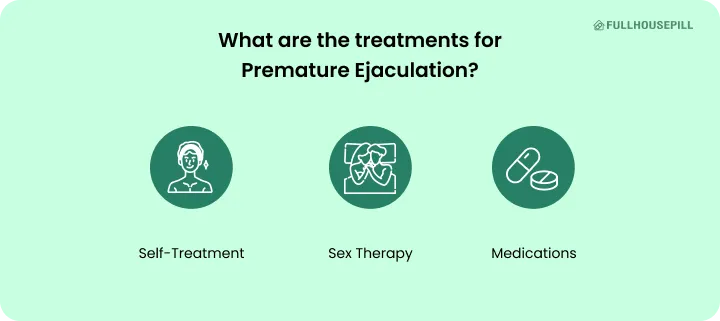
Is premature ejaculation normal?
Premature ejaculation is a normal and common sexual issue affecting millions of men globally. In the United States, around 1 in 3 men between the ages of 18 and 59 experience PE. Worldwide studies estimate that between 3% and 41% of men experience PE at some point, with most estimates ranging from 20% to 30%. These numbers show that PE is not rare or abnormal. Contrary to popular belief, PE does not affect only young men. Research shows that its frequency remains stable across different age groups. Many men with shorter IELT are satisfied, while some with longer IELT may still identify as premature ejaculators. The definition of PE relies more on personal satisfaction and distress than on exact timing.
What is the best medication for premature ejaculation?
No single medication is universally the best for premature ejaculation. Treatment choice depends on personal preferences, health status, and how the body responds to medication. Dapoxetine is the only drug specifically approved for PE in several countries and is often considered the first-line option. Other SSRIs such as fluoxetine, paroxetine, sertraline, citalopram, escitalopram, and clomipramine are frequently used off-label and have shown effectiveness in delaying ejaculation. Tramadol and alpha-blockers are also prescribed in some cases. Numbing sprays and PE wipes are suitable for men seeking fast, non-oral solutions. A healthcare provider can help determine the most appropriate medication based on individual needs.
How can I stop premature ejaculation immediately?
The most effective immediate solutions for premature ejaculation include behavioural techniques and topical treatments. The squeeze and stop-start techniques can be used during intercourse to delay climax. These methods require practice and communication between partners. Numbing creams, sprays, and wipes containing lidocaine or benzocaine can be applied 20 to 30 minutes before sex. These products reduce sensitivity and allow more control. Using condoms can enhance the effect by further dulling sensation. While these methods provide quick relief, long-term improvement often requires combining behavioural techniques with medication or therapy.
At what age does premature ejaculation start?
Premature ejaculation can start at any age. Lifelong PE begins with a man’s first sexual experiences and persists throughout life. Acquired PE develops later, often due to psychological or physical changes. Men in their teens and early adulthood may experience PE due to inexperience or anxiety. Middle-aged and older men may develop PE due to erectile dysfunction, prostate issues, or medication side effects. The condition is not limited to any specific age group.
Can wearing a condom help with premature ejaculation?
Wearing a condom can help delay ejaculation by reducing sensitivity in the penis. Many men report that condoms help prolong sexual activity. Thicker condoms or those designed specifically for PE can provide added desensitisation. Condoms can also be used with numbing creams to maximise the delay effect. Additionally, condoms help prevent sexually transmitted infections and unintended pregnancies.
What’s the difference between erectile dysfunction and premature ejaculation?
Premature ejaculation is a condition involving early ejaculation during sex. Erectile dysfunction (ED) is the inability to achieve or maintain an erection firm enough for intercourse. Both conditions can occur together but have different causes and treatments. Men with both issues often struggle to identify which problem came first. Erectile Dysfunction is sometimes treated first, as resolving erection problems can reduce performance anxiety and indirectly improve PE. Understanding the difference is important for effective treatment.
Does alcohol cause premature ejaculation?
Alcohol is not a direct cause of premature ejaculation, but it can influence sexual function. Small amounts of alcohol may reduce anxiety and temporarily delay climax for some men. Larger quantities often impair erectile function and sexual performance. Chronic alcohol use can contribute to both PE and ED. Healthcare providers often ask about alcohol use when diagnosing PE to rule out contributing factors. Reducing or avoiding alcohol may improve sexual control and performance in some cases.

Written & Reviewed By
Dr. William Henderson , MD (Couples Therapy and Sexual Health Specialist)
